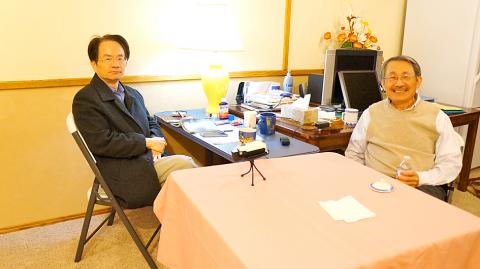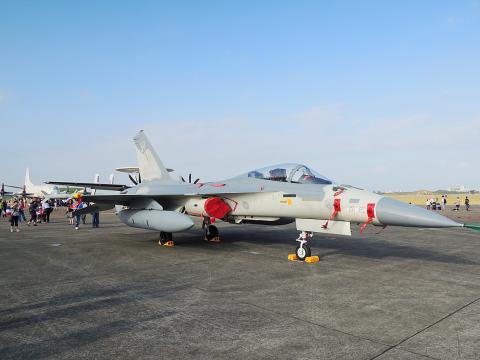Taiwan had plans to load miniaturized nuclear weapons into auxiliary fuel tanks of Indigenous Defense Fighter (IDF) jets to attack China, said Chang Hsien-yi (張憲義), who was the deputy director of the First Institute of the Chungshan Institute of Science and Technology (CSIST) and who defected to the US in 1988.
Due to the growing military threat from China, Taiwan during the 1980s conducted numerous military projects, including the research and development of mid-range surface-to-surface ballistic missiles, a nuclear weapons research project and the IDF project, Chang was quoted as saying in a new book that was based on an interview by Academia Sinica associate research fellow Chen Yi-shen (陳儀深), who last year went to the US to interview Chang.
Chang, a former colonel, said that the CSIST planned to use the IDF as a bomber because it was developed by Taiwan and its range could be fine-tuned without consulting other nations.

Photo provided by Walkers Cultural Publisher
“We wanted to extend the IDF’s range to 1,000km, as it would also extend the effective range of the nuclear weapon,” Chang was quoted as saying.
The plan was for a pilot — unmarried with no family and not having been told that they would be carrying a nuclear weapon — to fly the aircraft, Chang said.
With a nuclear weapon in the auxiliary fuel tank, the fighter jet would have a range of 800km, Chang said, adding that the pilot would only be told that they would be going on a mission from which they would probably not return.

Photo: Lo Tien-pin, Taipei Times
However, Chang said that the plan put ongoing US support at risk, adding that it was because of Taiwan’s ambitions that the US decided to “put the cards on the table.”
It was also because of this project that the US in 1988 forced Taiwan to shut down all facilities related to the development of nuclear weapons, as well as shuttering a heavy water reactor at the CSIST, Chang said.
When asked about his relationship with the US and the CIA, Chang said he was contacted by the CIA in 1982 and the agency established a task force on Taiwan and nuclear arms after he passed a polygraph test, adding that he would meet with CIA personnel every two or three months near Shilin (士林) night market in Taipei, mostly discussing what the government was purchasing for its nuclear weapons research, or the contents of CSIST or government meetings.
The CIA arranged his exit from Taiwan in 1988 by having a company registered in the US issue him a work visa and a new passport, providing a cover for him to fly from Kaohsiung to Seattle via Hong Kong, Chang said, adding that his wife transferred flights in Japan and met with him in the US.
Democratic Progressive Party Legislator Lo Chih-cheng (羅致政) yesterday said the decision to develop a nuclear deterrent had spanned military strategy, politics and diplomacy.
The US’ intervention was anticipated and reflective of the US as a hegemonic power, Lo said, but added that the US’ move was inexorably tied to Chang’s defection.
Putting aside the question of a soldier’s loyalty to his nation, and the moral question of developing nuclear weapons, Chang — while having been shielded from the Taiwanese judiciary — will have to answer to history for his actions, Lo said.
Meanwhile, a senior Ministry of National Defense official yesterday said that the nation’s policy regarding nuclear weapons is that “we do not manufacture, own or use nuclear weapons,” adding that since Taiwan does not have nuclear weapons, the possibility of attacking China with nuclear weapons does not exist.

CHAOS: Iranians took to the streets playing celebratory music after reports of Khamenei’s death on Saturday, while mourners also gathered in Tehran yesterday Iranian Supreme Leader Ayatollah Ali Khamenei was killed in a major attack on Iran launched by Israel and the US, throwing the future of the Islamic republic into doubt and raising the risk of regional instability. Iranian state television and the state-run IRNA news agency announced the 86-year-old’s death early yesterday. US President Donald Trump said it gave Iranians their “greatest chance” to “take back” their country. The announcements came after a joint US and Israeli aerial bombardment that targeted Iranian military and governmental sites. Trump said the “heavy and pinpoint bombing” would continue through the week or as long

TRUST: The KMT said it respected the US’ timing and considerations, and hoped it would continue to honor its commitments to helping Taiwan bolster its defenses and deterrence US President Donald Trump is delaying a multibillion-dollar arms sale to Taiwan to ensure his visit to Beijing is successful, a New York Times report said. The weapons sales package has stalled in the US Department of State, the report said, citing US officials it did not identify. The White House has told agencies not to push forward ahead of Trump’s meeting with Chinese President Xi Jinping (習近平), it said. The two last month held a phone call to discuss trade and geopolitical flashpoints ahead of the summit. Xi raised the Taiwan issue and urged the US to handle arms sales to

State-run CPC Corp, Taiwan (CPC, 台灣中油) yesterday said that it had confirmed on Saturday night with its liquefied natural gas (LNG) and crude oil suppliers that shipments are proceeding as scheduled and that domestic supplies remain unaffected. The CPC yesterday announced the gasoline and diesel prices will rise by NT$0.2 and NT$0.4 per liter, respectively, starting Monday, citing Middle East tensions and blizzards in the eastern United States. CPC also iterated it has been reducing the proportion of crude oil imports from the Middle East and diversifying its supply sources in the past few years in response to geopolitical risks, expanding

Pro-democracy media tycoon Jimmy Lai’s (黎智英) fraud conviction and prison sentence were yesterday overturned by a Hong Kong court, in a surprise legal decision that comes soon after Lai was jailed for 20 years on a separate national security charge. Judges Jeremy Poon (潘兆初), Anthea Pang (彭寶琴) and Derek Pang (彭偉昌) said in the judgement that they allowed the appeal from Lai, and another defendant in the case, to proceed, as a lower court judge had “erred.” “The Court of Appeal gave them leave to appeal against their conviction, allowed their appeals, quashed the convictions and set aside the sentences,” the judges